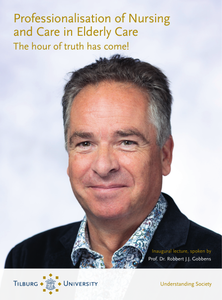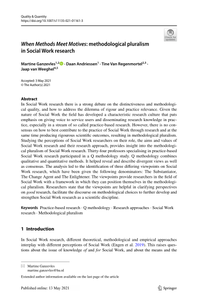In a matter of weeks last year, discussions regarding tourism in cities changed from how to deal with overtourism to how to deal with ‘no tourism’. Shortly thereafter, a great number of posts on LinkedIn, websites, and blogs highlighted how the tourism crisis that resulted from the COVID-19 pandemic could help reinvent tourism, into something more equal, inclusive, and sustainable. And so, online – at leastin mypersonalonlinebubble – there seemedtobe a real momentum for proper, transformative changes in (urban) tourism. How can we rebuild urban tourism in a sustainable and resilient way?
DOCUMENT

Inaugural lecture, delivered upon public acceptance of the endowed professorship in Professionalisation of Nursing and Care in Elderly Care by Prof. Dr. Robbert J.J. Gobbens at Tilburg University on 29 September 2023.
DOCUMENT

Recorded lectures provide an integral recording of live lectures, enabling students to review those lecture at their own pace and whenever they want. Most research into the use of recorded lectures by students has been done by using surveys or interviews. Our research combines this data with data logged by the recording system. We will present the two data collections and cover areas where the data can be triangulated to increase the credibility of the results or to question the student responses. The results of the triangulation show its value, in that it identifies discrepancies in the students' responses in particular where it concerns their perceptions of the amount of use of the recorded lectures. It also shows that we lack data for a number of other areas. We will still need surveys and interviews to get a complete picture.
DOCUMENT
A year later, in 2013, the Westerkwartier Area Cooperative was established – a new form of cooperation at the regional level, involving hundreds of dairy farmers, other SMEs, Terra MBO as the representative of the knowledge institutions in the region, the National Forest Service in the Netherlands (‘Staatsbosbeheer’), the Groningen Countryside Association (‘Landschapsbeheer Groningen’) and, later on, the De Zijlen healthcare institution. A year later, this initiative was followed by the establishment of the Southwest Drenthe Area Cooperative, another formalised multi-stakeholder cooperative on a large scale, bound together by a shared agenda. The members of these two new cooperatives sought to bring together and strengthen local and sectoral initiatives at the regional level. Because of their close cooperation with knowledge institutions, they hoped that practice-based research would yield a lot of results. At the many evening meetings and during workshops, spirited debates were held about new concepts such as bio-based economy, new concepts in food and health, alternative methods of energy production, but also ways of improving the quality of life in the region, strengthening the tourism industry and creating jobs for young people. Those involved were all too aware that the existing educational and research institutes and government agencies, and the organisational structures used by businesses, tend to do more harm than good, which led to the call for Next Education, Next Governance and Next Business. It became apparent from these discussions that there were many knowledge questions to be explored, and the need arose for a permanent link with the knowledge institutions through the establishment of a separate professorship focused on sustainable and cooperative entrepreneurship for the benefit of the entrepreneurs involved as well as for the education sector, the government and the general public. This is how the Sustainable Cooperative Entrepreneurship professorship came about, as part of the Sustainable Financial Management professorship chaired by Dr Margreet Boersma at Hanze University of Applied Sciences Groningen’s School of Financial and Economic Management. I am honoured to be giving this new professorship shape, and I would like to point out that I will not be doing this on my own – I am only the figurehead of a very substantial group of innovative and ambitious entrepreneurs, students, lecturers, public servants, citizens and colleagues. The Innovation Army is marching. And if you are not a part of it yet, now is the time to get involved!
DOCUMENT
The 6th International Human Rights Education Conference is about teaching human rights. The purpose of this convention is to protect and promote the right of people with disabilities to participate equally in societal life. Implementation of the convention is a responsibility of the national government. At the Utrecht University of Applied Sciences a social work course now includes an introductory lecture on human rights using objects and a game that addresses the UN Convention on the Rights of Persons with Disabilities.
LINK
In this paper we analyse the way students tag recorded lectures. We compare their tagging strategy and the tags that they create with tagging done by an expert. We look at the quality of the tags students add, and we introduce a method of measuring how similar the tags are, using vector space modelling and cosine similarity. We show that the quality of tagging by students is high enough to be useful. We also show that there is no generic vocabulary gap between the expert and the students. Our study shows no statistically significant correlation between the tag similarity and the indicated interest in the course, the perceived importance of the course, the number of lectures attended, the indicated difficulty of the course, the number of recorded lectures viewed, the indicated ease of finding the needed parts of a recorded lecture, or the number of tags used by the student.
LINK
In Social Work research there is a strong debate on the distinctiveness and methodological quality, and how to address the dilemma of rigour and practice relevance. Given the nature of Social Work the field has developed a characteristic research culture that puts emphasis on giving voice to service users and disseminating research knowledge in practice, especially in a stream of so called practice-based research. However, there is no consensus on how to best contribute to the practice of Social Work through research and at the same time producing rigourous scientific outcomes, resulting in methodological pluralism. Studying the perceptions of Social Work researchers on their role, the aims and values of Social Work research and their research approach, provides insight into the methodological pluralism of Social Work research. Thirty-four professors specialising in practice-based Social Work research participated in a Q methodology study. Q methodology combines qualitative and quantitative methods. It helped reveal and describe divergent views as well as consensus. The analysis led to the identification of three differing viewpoints on Social Work research, which have been given the following denominators: The Substantiator, The Change Agent and The Enlightener. The viewpoints provide researchers in the field of Social Work with a framework in which they can position themselves in the methodological pluralism. Researchers state that the viewpoints are helpful in clarifying perspectives on good research, facilitate the discourse on methodological choices to further develop and strengthen Social Work research as a scientific discipline
DOCUMENT

From the article: Though organizations are increasingly aware that the huge amounts of digital data that are being generated, both inside and outside the organization, offer many opportunities for service innovation, realizing the promise of big data is often not straightforward. Organizations are faced with many challenges, such as regulatory requirements, data collection issues, data analysis issues, and even ideation. In practice, many approaches can be used to develop new datadriven services. In this paper we present a first step in defining a process for assembling data-driven service development methods and techniques that are tuned to the context in which the service is developed. Our approach is based on the situational method engineering approach, tuning it to the context of datadriven service development. Published in: Reinhartz-Berger I., Zdravkovic J., Gulden J., Schmidt R. (eds) Enterprise, Business-Process and Information Systems Modeling. BPMDS 2019, EMMSAD 2019. Lecture Notes in Business Information Processing, vol 352. Springer. The final authenticated version of this paper is available online at https://doi.org/10.1007/978-3-030-20618-5_11.
MULTIFILE

the role of higher education in fostering young professionals’ global competence
DOCUMENT

To prepare medical students appropriately for the management of toxicological emergencies, we have developed a simulation-based medical education (SBME) training in acute clinical toxicology. Our aim is to report on the feasibility, evaluation and lessons learned of this training. Since 2019, each year approximately 180 fifth-year medical students are invited to participate in the SBME training. The training consists of an interactive lecture and two SBME stations. For each station, a team of students had to perform the primary assessment and management of an intoxicated patient. After the training, the students completed a questionnaire about their experiences and confidence in clinical toxicology. Overall, the vast majority of students agreed that the training provided a fun, interactive and stimulating way to teach about clinical toxicology. Additionally, they felt more confident regarding their skills in this area. Our pilot study shows that SBME training was well-evaluated and feasible over a longer period.
DOCUMENT
